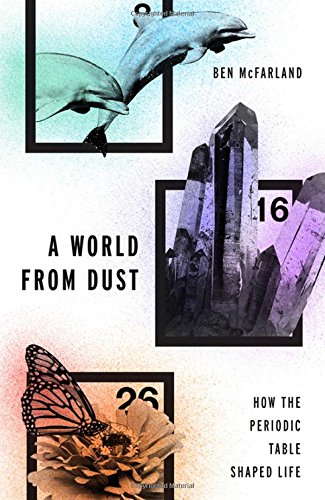![]() A World from Dust: How the Periodic Table Shaped Life by Ben McFarland
A World from Dust: How the Periodic Table Shaped Life by Ben McFarland
 A World from Dust: How the Periodic Table Shaped Life (2016), by Ben McFarland, can at times be a difficult read, but despite that, and regardless of some writing/structural issues, it’s an often engaging and always confidently informative exploration of how life was driven down certain paths by the implacable requirements of chemistry.
A World from Dust: How the Periodic Table Shaped Life (2016), by Ben McFarland, can at times be a difficult read, but despite that, and regardless of some writing/structural issues, it’s an often engaging and always confidently informative exploration of how life was driven down certain paths by the implacable requirements of chemistry.
McFarland’s perspective contrasts directly, as he describes on several occasions, with Stephen J. Gould’s pronouncement that if the “tape of life” were rerun from the beginning, the end result would be wildly different (meaning we humans most likely wouldn’t be around to notice that). McFarland argues that Gould may have a point in a very narrow sense, but is incorrect when one takes a broader viewpoint, because the chemistry of the planet, as well as its geology (often driven by the chemistry) meant only certain channels were available for life. Geology and chemistry constrained and directed biology, leading it down a limited number of pathways while blocking off others completely. Or as he puts it:
Gould is right when it comes to individual species, but I think he is wrong at the broader levels of ecosystems and planetary evolution … the tape of life is likely more predictable … something less like a tape and more like a river, its liquid flow channeled by the solid banks of chemical laws.
The organizing principle of chemistry is the periodic table, and McFarland takes that as the organizing principle of A World from Dust as well, laying out why the elements’ positions on the tightly structured table qualify them or disqualify them as engines of life. To that end, he covers a fair amount of physics and biochemistry at an often highly detailed level, discussing electron orbits, ion channels, charges, bonds, structures of molecules, cell mechanics, and the like. The book is replete with diagrams which often helped with the difficult science, though at least in the Kindle edition the layout created more obstacles than it should have, making them less effective. The same is true of some of McFarland’s metaphors, with some simplifying things and others not being quite as effective as teaching tools.
But if one weathers the sometimes difficult nature (I’m assuming a lay audience here), it makes for a fascinating and certainly mostly understandable story — the creation of the elements in space, how they make their way to being part of the Earth, the “evolution” of minerals (a concept that makes perfect sense but that I’d never thought of before), the ways, bit by bit, that life began to incorporate new chemistry in a progression toward generally increasing complexity. Within that tale McFarland discusses the origin of life, the possibility of life on other planets, the creation of the moon, the many extinction events, the ice ages, the oxygenation of the planet and the huge repercussions from that event, and finally the impact of the human brain and “eusociality” on evolution itself.
McFarland’s personality shines through in his non-science referents, such as allusions to J.R. R. Tolkien and his experience with a Wagner opera. These moments are relatively rare but welcome, not only humanizing our guide and adding a lighter touch, but also reminding us that these processes are not aloof from our personal day to day experiences, our lived lives, but are part and parcel of it.
McFarland sometimes stumbles, occasionally gets in his own way, sometimes dives a bit too deep into the weeds perhaps for a lay audience, but I have no complaints about a book that requires you to pay attention, to retain what the author mentioned a page or twenty or a hundred back, or to even, gasp, reread a passage or two. The book rewards the reader’s attention, and there’s no doubt anyone finishing A World from Dust will have a greater understanding of how we got to where we are today and how pivotal a role basic chemistry played in that journey.



I like the idea of the “river of life” flowing into certain, even limited, channels. Very neat.
With all the discoveries on other planets in our system, this book seems like it would be a good foundation.